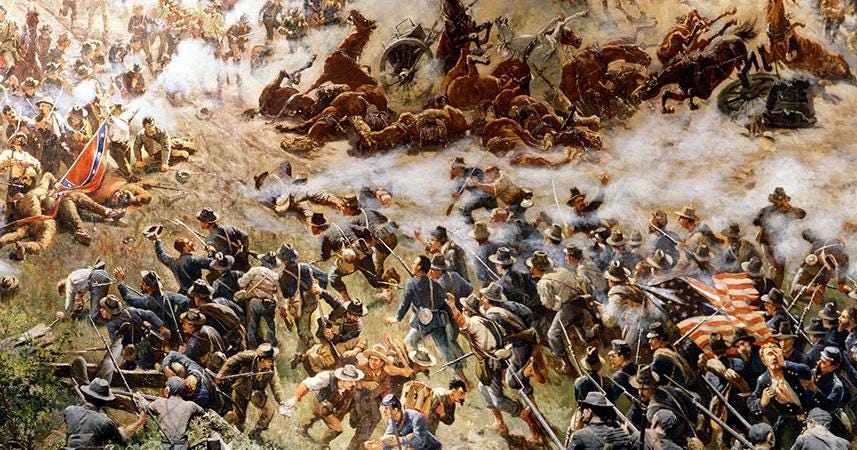At the beginning of each semester, I tell my students that I don't care about dates in history. I relate that my mother could never remember whether the rhyme was “In fourteen hundred and ninety two, Columbus sailed the ocean blue," or “In fourteen hundred and ninety three, Columbus sailed the deep blue sea." It didn't really matter. Either way, he got to America.
Dates are important, I tell my students, only in allowing us to keep track of what happened before what else. If event A happened before event B, A might have influenced B. But not the other way around. In our universe, causation always flows down the stream of time.
The fortunes of the Union during the Civil War summer of 1864 illustrate the point. At the beginning of the summer, Abraham Lincoln was nearly in despair. Three years into the war, the defeat of secession seemed hardly closer than at the war's start. A presidential election was approaching, and Lincoln feared that disappointed voters would turn him out in favor of a candidate less devoted to victory. The opposing party, the Democrats, were loudly critical of Lincoln's war policies, and their national nominating convention appeared likely to adopt a peace platform calling for a compromise with the Confederacy.
Lincoln prepared for his ouster. “This morning, as for some days past, it seems exceedingly probable that this Administration will not be re-elected,” he wrote on August 23. "Then it will be my duty to so co-operate with the President elect as to save the Union between the election and the inauguration; as he will have secured his election on such ground that he can not possibly save it afterwards."
Lincoln folded and sealed this memorandum and took it to a meeting of his cabinet. He had the members sign the outside of the unread memo, binding himself to working with his successor in the likely event of defeat at the polls.
The Democrats convened a few days later. They castigated Lincoln's handling of the war, including his suspension of parts of the Constitution. They called for peace. "Justice, humanity, liberty, and the public welfare demand that immediate efforts be made for a cessation of hostilities,” their platform said. They nominated George McClellan, a Union general, who tried to distance himself from the platform while still criticizing Lincoln. McClellan said he would simply conduct the war better than the Republican incumbent. But his message of firmness was diluted by the Democrats’ nomination of George Pendleton for vice president. Pendleton was outspoken in favor of immediate peace and in denial of the federal government’s right to compel states to remain in the Union.
Lincoln's spirits sank further.
But then he received the most welcome news. Union general William Sherman had been battling Confederate forces in Georgia since mid-summer. The fighting was bitter and frustrating. Finally, on September 3, Sherman telegraphed from the front, “Atlanta is ours, and fairly won."
The news followed shortly the report of a victory by Union warships under David Farragut at Mobile Bay. That feat now took on added significance as suggesting the imminent collapse of the South. Further good news came from the Shenandoah Valley, where Union general Philip Sheridan was laying waste to the breadbasket of the Confederacy.
The timing of the Union victories was as important as the fact of their accomplishment. Had they been delayed a few months, Lincoln's prophecy of his defeat at the polls might well have proved true. If they had not occurred before the election, they might not have occurred at all, as the balance of political and moral forces would have been very different. And even if they had occurred after the election, their impact would not have been the same.
But the victories did come before the election. And they carried in Lincoln to victory with voters. Lincoln's victory in turn carried the Union to victory in the war, which ended in April 1865. The Union held together, and has never been seriously threatened since. Finally, the victory of the Union redeemed the promise of the Emancipation Proclamation, which would have been empty without it.


"Either way, he got to America." Or, as he would have said, "Cathay".